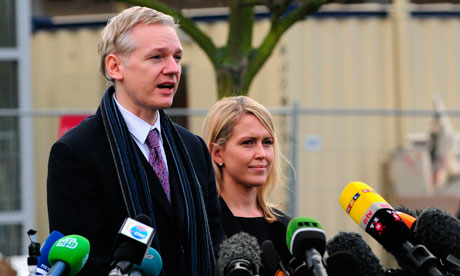Julian Assange is very likely to be extradited, says Matrix barrister
Julian Knowles, an expert in extradition law, dismisses the arguments made by the WikiLeaks founder's lawyers

It is "very likely" that a senior district judge will order the extradition of Julian Assange to Sweden to face sexual assault charges, a barrister at Matrix Chambers predicted this week.
Julian Knowles, who has written books on extradition law, was being interviewed on Law in Action, the weekly programme I present for BBC Radio 4.
He dismissed two preliminary arguments raised by Assange's defence team: that the Swedish prosecutor Marianne Ny had no power to issue a European arrest warrant and that the WikiLeaks founder was wanted merely for questioning rather than to face trial.
"There is no doubt that a Swedish prosecutor does have the power to issue warrants," said Knowles. "And the Swedish prosecutor has made it clear that Mr Assange is wanted for trial if he goes back. Unless he can demonstrate his innocence before trial, he will be tried."
Another argument put forward by Assange was that the allegations of rape and sexual assault against him did not amount to offences for which he could be extradited. Again, though, Knowles was unimpressed. If what's alleged against Assange had taken place in the UK, the barrister explained, it would "obviously" constitute sexual assault.
As for the claim that there might be a breach of Assange's right to a fair trial because some of the evidence against him would be heard behind closed doors, Knowles said that the threshold of unfairness was a very high one: "You have to show there would be no meaningful trial at all."
And the barrister was scathing about defence arguments that Assange might be re-extradited from Sweden to the US, where he might be held at Guantánamo Bay or face the death penalty. "That is, frankly, a hopeless argument," Knowles said.
This was confirmed by Amy Jeffress, the US justice department's attache to the American embassy in London.
"The president, of course, has decided to close Guantánamo Bay," she told Law in Action, "and so no one is going to Guantánamo Bay and that claim is baseless."
Jeffress added that the US always gave assurances in any case for which it had requested extradition that prosecutors would not seek the death penalty.
But Thursday's ruling by Judge Riddle will not be the end of the story. The losing side has a right of appeal to the high court and will certainly exercise it. So the case might not be resolved before the summer.
Jeffress stressed that no charges had been brought against Assange over in the US, although she confirmed that there was an investigation into the WikiLeaks case and accepted that any application to a grand jury for a federal arrest warrant would be heard in private. But what would happen if the US requested Assange's extradition while he was still at risk of being sent to Sweden?
It would then be up to the home secretary to decide between the two competing applications. Knowles thought that the home secretary, Theresa May, would give preference to an application from the US.
While I was at the US embassy, I asked Jeffress about the case of Gary McKinnon, who is accused of hacking into US military computers from his bedroom in London. The offences were said to have begun 10 years ago, when he was still using a slow, dial-up modem.
Jeffress said that the US was still seeking McKinnon's extradition, despite medical evidence that he has Asperger's syndrome. His extradition has been held up while May considers doctors' reports.
But how can this be when the Extradition Act 2003 deliberately removed the discretion that ministers used to have in extradition cases? It turns out that the law has changed without anybody noticing it – and all thanks to the Human Rights Act.
The home secretary apparently accepts that a person whose extradition has been ordered by the courts can still claim that being sent abroad for trial would breach his or her human rights, particularly if circumstances have changed since the case was before the courts. That opens the door for a whole new round of applications for judicial review.
It's something of a lifeline for a government that does not want to see a sympathetic figure like McKinnon extradited. Whether ministers will look so kindly on a similar application by Assange remains to be seen.
Joshua Rozenberg is a freelance legal writer, commentator and broadcaster


No comments:
Post a Comment